
- We will send in 10–14 business days.
- Author: Cristina Magaldi
- Publisher: Scarecrow Press
- ISBN-10: 0810850257
- ISBN-13: 9780810850255
- Format: 14.9 x 22.4 x 1.9 cm, hardcover
- Language: English
- SAVE -10% with code: EXTRA
Reviews
Description
This resource is an interesting look at how European culture, particularly European music, related to the social and cultural experiences of the residents of ninteenth-century Rio de Janeiro. The focus is on how Cariocas (residents of Rio de Janeiro) responded to and often imitated different musical styles imported from Europe. After introducing the local musical setting and showing how musical life in imperial Rio de Janeiro reflected Parisian models, the author discusses the importation of operatic repertory, the use of German classical music as the basis of an elite social class, the role of European music in Brazilian theater, and finally, the emergence of a "national" music. Overall, this study reveals European music as a powerful force in the internal processes of political, cultural, social, and ethnic negotiations during the 19th century government of Emperor Pedro II. Musicologists, Latin American historians, and anyone with an interest in urban studies will find much of interest in this book.
EXTRA 10 % discount with code: EXTRA
The promotion ends in 18d.12:04:18
The discount code is valid when purchasing from 10 €. Discounts do not stack.
- Author: Cristina Magaldi
- Publisher: Scarecrow Press
- ISBN-10: 0810850257
- ISBN-13: 9780810850255
- Format: 14.9 x 22.4 x 1.9 cm, hardcover
- Language: English English
This resource is an interesting look at how European culture, particularly European music, related to the social and cultural experiences of the residents of ninteenth-century Rio de Janeiro. The focus is on how Cariocas (residents of Rio de Janeiro) responded to and often imitated different musical styles imported from Europe. After introducing the local musical setting and showing how musical life in imperial Rio de Janeiro reflected Parisian models, the author discusses the importation of operatic repertory, the use of German classical music as the basis of an elite social class, the role of European music in Brazilian theater, and finally, the emergence of a "national" music. Overall, this study reveals European music as a powerful force in the internal processes of political, cultural, social, and ethnic negotiations during the 19th century government of Emperor Pedro II. Musicologists, Latin American historians, and anyone with an interest in urban studies will find much of interest in this book.


Reviews